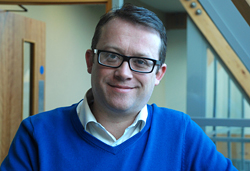Free legal service launched – only one of its kind in the UK
Fri, 17 Jan 2014 11:13:00 GMT
University’s Legal Advice Clinic helps members of the public who cannot afford to pay for advice nor secure legal aid
 A FREE legal service launched by the University of Huddersfield is the first of its type in the UK and it has a bulging caseload, partly as a result of cutbacks in legal aid which are preventing many people from being able to seek the help of a solicitor.
A FREE legal service launched by the University of Huddersfield is the first of its type in the UK and it has a bulging caseload, partly as a result of cutbacks in legal aid which are preventing many people from being able to seek the help of a solicitor.
The Legal Advice Clinic (LAC) occupies premises in Huddersfield’s Pack Horse Shopping Centre and is open from Monday to Friday. Members of the public visit in order to make appointments to hold consultations with specially-selected law students. Before any advice is given, it is carefully scrutinised by law lecturers. The local legal profession is also providing expert back-up.
The LAC opened to the public in October 2013 and aims to complete at least 120 consultations during the academic year. Demand has been high, with the Clinic fully booked in the months leading up to Christmas, and the concept has earned the interest and approval of prominent lawyers.
The official opening of the Clinic took place on the 16 January and was carried out by the President of the Law Society, Nick Fluck, and leading judges, councillors and politicians were in attendance.
In this video Nick Fluck talks about the proposed Government cuts in legal aid.
The LAC is the brainchild of Philip Drake, a qualified and widely-experienced solicitor who is now a Senior Lecturer in Law at the University of Huddersfield.
Other universities offer law clinics, he said, but Huddersfield’s LAC is quite unique in its ethos and being based off-campus.
“We wanted to be in premises that people would feel comfortable about visiting,” he said. “Our students identified that the people we are aiming to help, who can’t afford to pay for advice and who can’t get legal aid, do not feel comfortable walking on to a university campus.”
The LAC deals purely with civil law. Contract disputes, personal injury, wills, employment issues and family law are among the areas covered so far. Clients must be able to demonstrate that they cannot afford to pay for advice nor secure legal aid assistance.
 Government cutbacks in the legal aid budget have meant that many areas of the law no longer qualify for assistance. This has been a factor in the mounting demand for the Legal Advice Clinic, says Philip Drake (pictured right).
Government cutbacks in the legal aid budget have meant that many areas of the law no longer qualify for assistance. This has been a factor in the mounting demand for the Legal Advice Clinic, says Philip Drake (pictured right).
“We cannot fill the gap created by the withdrawal of legal aid, but the Clinic helps people who otherwise would have no access to legal advice,” he added.
The LAC has a full-time administrator – business student Adam Kyle, who is spending a year’s placement at the Clinic – and clients make appointments to see two student advisers and set out the facts of their case. A supervisor is also present. Then follows a process that includes a selection panel at which students discuss aspects of the case and what advice needs to be given to a client. This is the stage at which a decision is made whether or not to take on a case.
 If the go-ahead is given, the students carry out detailed legal research and draft a letter of advice, which is scrutinised by a supervisor. The letter is usually sent out within a fortnight of the initial consultation.
If the go-ahead is given, the students carry out detailed legal research and draft a letter of advice, which is scrutinised by a supervisor. The letter is usually sent out within a fortnight of the initial consultation.
“If a client finds it difficult to follow the advice, which is very detailed and could be four or five pages long, then the students will explain it to them,” said Mr Drake.
“If the selection panel decide we can’t take the case on for whatever reason, we will try to find help for a client from somewhere else,” he continued. “We have built up many links with local charities and organisations such as Kirklees Housing, the Citizens Advice Bureau and Kirklees Law Centre.”
The Huddersfield Incorporated Law Society and the local legal profession have been highly supportive, said Mr Drake. The LAC has developed a “phone-a-legal-friend” system. This enables students to seek swift specialist advice from experienced local lawyers.
The students have also been working with the Huddersfield County Court and local professional lawyers on a duty solicitor volunteer scheme whereby advice is given to members of the public who are attending the county court and do not have legal representation. This scheme was the brainchild of local solicitor and partner at Ridley & Hall Solicitors, Sarah Young. It involves local solicitors and the students attending court on an entirely voluntary basis to help and advise members of the public at the county court.
In addition to all of this, the Legal Advice Clinic has also been providing law students to Kirklees Law Centre to assist with benefits advice and appeals. As well as advising members of the public on benefit matters, some of these students have also been preparing appeals for the withdrawal of disability living allowance and representing these individuals in the actual appeal hearings.
The LAC is also innovative because of the special assessment system devised in tandem with University psychologists to select suitable second, third and fourth-year law students to work in the Clinic.
Aided by a £50,000 grant from the Higher Education Academy, a “competency assessment centre” was designed. It includes simulated client interviews and an appraisal of the ethical competency and values of students.
After the first competency assessment centre was conducted, 20 students, with four in reserve, were selected as advisers for the LAC, where they are formed into ‘firms’ of four students.
“A lot of law students will undertake this kind of project in order enhance their CVs,” said Mr Drake.
“But with the Legal Advice Clinic we have found that the students really want to make a difference and help people in the community. And that is exactly the kind of student we were looking for through our selection process.”
Law student members of the LAC have – on their own initiative – worked with local members of the profession to set up an Amnesty International Huddersfield Branch and students have been elected as Deputy Chair, Secretary, Deputy Secretary and in charge of fundraising to this branch.
Said Mr Drake: “The students in the Legal Advice Clinic take a reflective and holistic approach to the law, so they are sensitive to the ethical issues that arise in individual cases. Their focus is upon the client, rather than their own individual learning needs, and it is through such a focus, that they develop their professional identity and values in the law, as well as their technical skills, to prepare them as lawyers for the future.”







